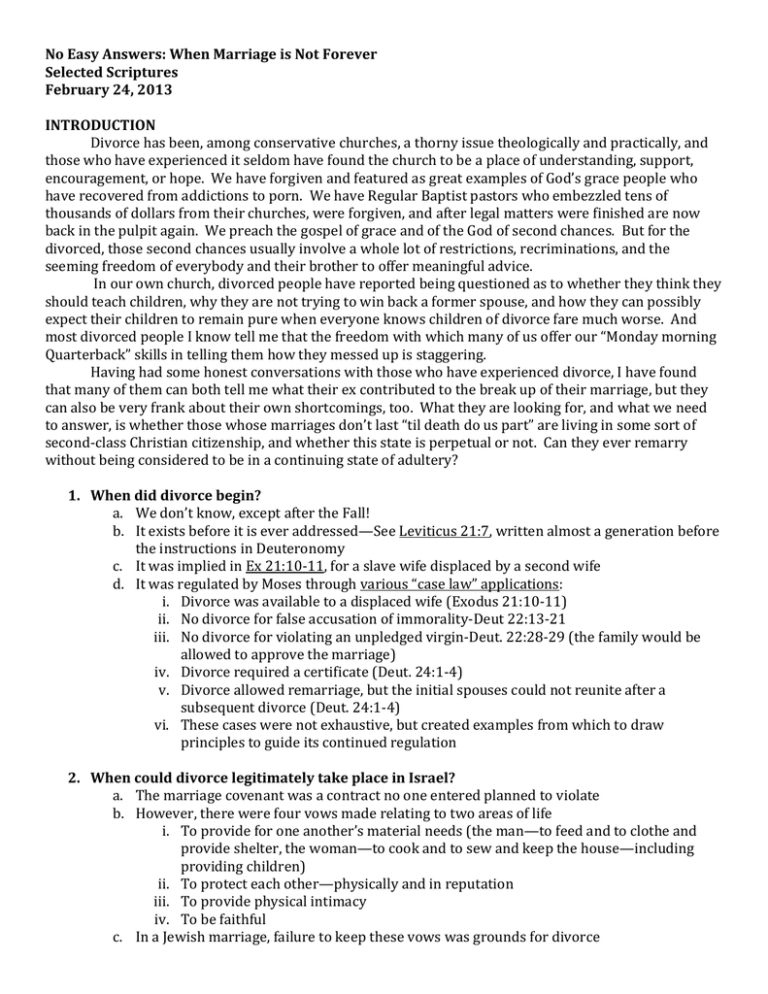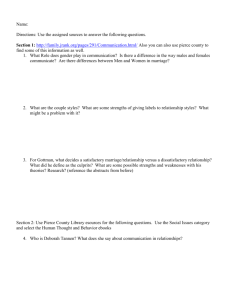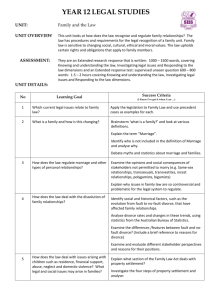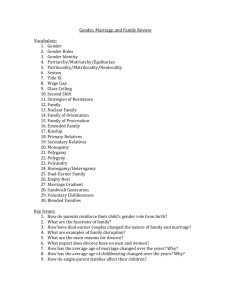
No Easy Answers: When Marriage is Not Forever
Selected Scriptures
February 24, 2013
INTRODUCTION
Divorce has been, among conservative churches, a thorny issue theologically and practically, and
those who have experienced it seldom have found the church to be a place of understanding, support,
encouragement, or hope. We have forgiven and featured as great examples of God’s grace people who
have recovered from addictions to porn. We have Regular Baptist pastors who embezzled tens of
thousands of dollars from their churches, were forgiven, and after legal matters were finished are now
back in the pulpit again. We preach the gospel of grace and of the God of second chances. But for the
divorced, those second chances usually involve a whole lot of restrictions, recriminations, and the
seeming freedom of everybody and their brother to offer meaningful advice.
In our own church, divorced people have reported being questioned as to whether they think they
should teach children, why they are not trying to win back a former spouse, and how they can possibly
expect their children to remain pure when everyone knows children of divorce fare much worse. And
most divorced people I know tell me that the freedom with which many of us offer our “Monday morning
Quarterback” skills in telling them how they messed up is staggering.
Having had some honest conversations with those who have experienced divorce, I have found
that many of them can both tell me what their ex contributed to the break up of their marriage, but they
can also be very frank about their own shortcomings, too. What they are looking for, and what we need
to answer, is whether those whose marriages don’t last “til death do us part” are living in some sort of
second-class Christian citizenship, and whether this state is perpetual or not. Can they ever remarry
without being considered to be in a continuing state of adultery?
1. When did divorce begin?
a. We don’t know, except after the Fall!
b. It exists before it is ever addressed—See Leviticus 21:7, written almost a generation before
the instructions in Deuteronomy
c. It was implied in Ex 21:10-11, for a slave wife displaced by a second wife
d. It was regulated by Moses through various “case law” applications:
i. Divorce was available to a displaced wife (Exodus 21:10-11)
ii. No divorce for false accusation of immorality-Deut 22:13-21
iii. No divorce for violating an unpledged virgin-Deut. 22:28-29 (the family would be
allowed to approve the marriage)
iv. Divorce required a certificate (Deut. 24:1-4)
v. Divorce allowed remarriage, but the initial spouses could not reunite after a
subsequent divorce (Deut. 24:1-4)
vi. These cases were not exhaustive, but created examples from which to draw
principles to guide its continued regulation
2. When could divorce legitimately take place in Israel?
a. The marriage covenant was a contract no one entered planned to violate
b. However, there were four vows made relating to two areas of life
i. To provide for one another’s material needs (the man—to feed and to clothe and
provide shelter, the woman—to cook and to sew and keep the house—including
providing children)
ii. To protect each other—physically and in reputation
iii. To provide physical intimacy
iv. To be faithful
c. In a Jewish marriage, failure to keep these vows was grounds for divorce
2
i. The person who broke the vows was the one guilty of breaking the marriage
covenant, not the wronged partner
ii. Only the wronged partner could seek divorce
d. A major factor in any divorce—the bride wealth (Heb. Ketubah)
i. A bride who was divorced for such causes would lose her dowry
ii. A husband who was divorced for such causes would have to give his wife her dowry
and whatever he had pledged beyond that
3. What about the New Testament?
a. Changes in Israel
i. Israel in captivity had experienced different divorce laws
ii. In Israel, Rabbi Hillel said Deut. 24:1 allowed for divorce for TWO reasons: “any
cause” or “indecency—i.e., sexual immorality”
1. This was opposed unsuccessfully by Rabbi Shammai, who said Deut. 24:1
only had sexual immorality in mind.
2. Neither school eliminated the other three vows and causes for divorce, but
Hillel’s view created a “no fault” divorce.
3. Joseph was going to use this to divorce Mary (Matt 1).
4. Hillel’s view was commonly accepted by the time of Jesus.
iii. When Jesus preaches his Sermon on the Mount (Matt 5-7), he does not undo the
Law, but he takes it to the heart.
1. If adultery springs from lust, then lust is also sinful
2. If using oaths to deceive is wrong, all deceiving is wrong
3. If marriage is holy, then it should be protected, not abused. Easy, “no cause”
divorce leads to adultery, not freedom.
iv. When the Pharisees ask if it is lawful to divorce for any cause, they CANNOT be
asking if divorce is “lawful,” because Moses has said it was, and to call Moses
“unlawful” would be blasphemous for them. THEY ARE ASKING ABOUT “NO CAUSE”
DIVORCE.
1. Jesus answers their question by siding with Shammai, using his wording
“except for sexual immorality”
2. He specifically points to why “no cause” divorce was popular—a man could
easily move from one woman to the next and stay married—a Jewish ideal.
3. He says that divorce originates in hard hearts—not that those who may find
themselves in a divorce are hard-hearted, but rather hardness of heart
toward God—SIN—leads to broken relationships.
4. So, Jesus answers the question about “no cause” divorce, and keeps “sexual
immorality” as the appropriate interpretation of Deut. 24:1
5. BUT, Jesus does not reference the other violations of the marriage covenant
that were never under debate.
6. As a rule of thumb, unless the NT sets aside teaching from the OT, Christians
have considered it to be worthy of following—
a. Laws on rape only come from the OT
b. Laws concerning murder are spelled out in the OT, including the
difference between accidental killing and murder
c. Jesus’ teaching on divorce can be seen as a reinforcement of an OT
teaching, not the abolition of all divorce.
d. Jesus DOES emphasize in Matt. 19 the “one flesh” between man and
woman, which would reinforce monogamy, not polygamy.
3
v. When Mark and Luke report Jesus’ teaching, they don’t record Jesus saying “except
for immorality.” Why?
1. Again, the question as to whether divorce was lawful would not make sense.
Of course it was lawful—it was in the writings of Moses.
2. Everyone would know that it was “any cause” that was under debate.
3. A parallel from our day would be if I asked, “Is it lawful for fourteen year olds
to drink?” Most people would say, “NO,” realizing I am not referring to water,
soft drinks, or milk, but “to drink” carries the meaning “to drink alcohol.”
b. What about Paul’s teaching among the Gentiles?
i. Last week, we talked about the four different kinds of marriages, and the ease with
which people entered and left them in the Roman empire.
ii. In addition, you had lots of immorality in various cities where cult prostitutes were
a part of religious observances for various gods.
iii. Whatever Paul taught would not be contrary to the morality of the OT—meaning if
divorce was acceptable in some cases, he would not go beyond Jesus in forbidding it.
iv. Paul’s teaching in 1 Corinthians 6:12 to 7:40 can be summarized as follows:
1. Flee sexual immorality because your body belongs to Christ first of all
2. Celibacy is good when it is in response to God’s gifting and calling
3. In marriage, sexual intimacy is a duty (this echoes the teaching of the OT
from Exodus 21 and onward), and it is not to be withheld.
4. Unmarried people may be better off unmarried, but if sexual passion is at
work, it is better to marry.
5. Married people should not divorce, and should reconcile or remain
unmarried if they do.
a. This is sometimes seen as finalizing a “no divorce” position.
b. However, the following case allows divorce for abandonment by a
non-believing spouse (again, case law like the OT)
c. Paul would not contradict Jesus’ teaching in Matt. 19.
d. So, it would seem that Paul is making a general statement against the
rampant practice of divorce, not ruling out what he later rules “in.”
6. Unequally yoked marriage partners should stay married, but if the
unbeliever will not, then the believer is free (from the marriage).
7. Serve God in whatever state you are in.
8. Deciding to get married is just that—your decision. Do what you believe God
wants you to do, knowing that singleness may be the best course for you, but
marriage is certainly a good option.
v. What about Romans 7:2-3?
1. A married woman is bound to her husband until he dies.
2. If a married woman lives with another man, she violates the law of marriage
and is an adulteress.
3. HOWEVER, Paul and anyone who knew the Law recognized that a divorced
woman was “unmarried,” and therefore did not currently have a husband.
4. Paul is using this example for something else, NOT to establish the
permanence of marriage.
4. “God hates divorce.”
a. This is one translation of Malachi 2:16, but not necessarily the best one.
b. Another is that God hates the faithlessness of those who divorce their wives, who were in a
faithful covenant with them.
4
c. God hates all kinds of sin. Prov 6:16-19 “There are six things that the LORD hates, seven
that are an abomination to him: 17 haughty eyes, a lying tongue, and hands that shed
innocent blood, 18 a heart that devises wicked plans, feet that make haste to run to evil, 19 a
false witness who breathes out lies, and one who sows discord among brothers.”
d. BUT, God does hate the pain of divorce, because He describes himself as “divorced.”
i. Isa 50:1—He sent away Israel with a divorce certificate
ii. Jer 3:1, 8—Judah has not learned from Israel’s fate, and is going to be divorced as
well
iii. God had been faithful to Israel, clothed her and provided her with jewels fit for a
queen--Ezek 16:8-13
iv. Israel’s covenant was broken by their continual disobedience:
1. She did not return God’s love but committed adultery with idols—Ezek 16:15
2. She offered food, clothing, and jewels to the idols—the clothing and jewels
God had given her—Ezek 16:16-19
e. God, the reluctantly divorced one, understands this pain, but as one person I heard said it,
God would no longer qualify to be a pastor of a Baptist Church!
5. So, what should we do? Here is my own pastoral perspective.
a. We teach the importance and permanence desired for marriage in God’s plan
b. We understand that fallen humanity experiences brokenness in relationships, and this
includes broken marriages
c. We recognize the seriousness of the marriage covenant, and the seriousness of breaking
one’s vows.
d. We allow the wronged party to determine at what point forgiveness will be extended and
at what point a divorce may be sought.
e. We do not believe in divorce simply because a person wants one. Frivolous divorce,
especially to pursue someone else in marriage, is equated with adultery in Matt 19.
f. Divorce exists for one key reason—to establish a person’s ability to remarry. Other
reasons also exist, but they are secondary in Scripture
g. We encourage forgiveness within marriage; and we accept that there are, and always have
been, violations of the marriage covenant that may break a marriage
h. When anyone comes to us, our first questions are not about the past or the future, but the
present—where is a person in relation to the Lord?
i. A wronged person who goes through divorce is always free to remarry.
j. A person who causes a divorce has sinned. They should repent of that sin. Remarriage
becomes an option when repentance is established and whatever restoration can be
accomplished has been accomplished.
CONCLUSION
For those who believe the standards are higher, and remarriage is seldom or never an option, may
I suggest at least ask that we measure our words, our opinions, and our judgments against Jesus’ words to
those who were about to stone the woman caught in adultery. We dare not come across as “the
righteous” as opposed to fellow sinners with our own brokenness that may be less visible but no less real.
This is a hard question, and many will feel that being “easier” on those divorced only lowers
standards. To which I would say that the job of the church is not to raise walls against those who are
broken, but rather to create paths toward repentance, forgiveness, and healing.
I may be wrong, and if so, I know I will give account for that. But I believe that God’s second
chances for a murderer like David, and a denier like Peter may imply second chances for those whose
earlier marriages ended badly as well.








